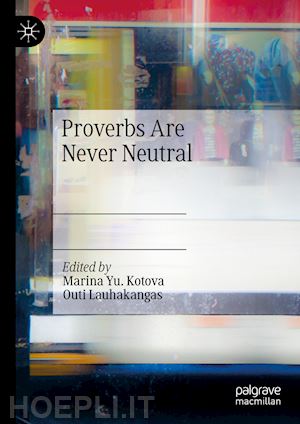
Questo prodotto usufruisce delle SPEDIZIONI GRATIS
selezionando l'opzione Corriere Veloce in fase di ordine.
Pagabile anche con Carta della cultura giovani e del merito, 18App Bonus Cultura e Carta del Docente
Outi Lauhakangas is an independent researcher, D.Soc.Sc in Helsinki University, Finland. She is one of the editorial consultants of the international journal Proverbium and a co-organizer of international colloquiums on proverbs. She has been the chief editor of a cultural magazine in Finland and published several nonfiction books about genres of folklore.
Marina Yu. Kotova teaches in the Department of Slavonic Philology of Saint Petersburg State University, Russia. She is a co-organizer of international philological conferences. She is an author of “Russian-Slavonic Dictionary of Proverbs with English parallels” (2000) and several monographs on contrastive paremiology, cultural studies, stylistics and translation studies.











Il sito utilizza cookie ed altri strumenti di tracciamento che raccolgono informazioni dal dispositivo dell’utente. Oltre ai cookie tecnici ed analitici aggregati, strettamente necessari per il funzionamento di questo sito web, previo consenso dell’utente possono essere installati cookie di profilazione e marketing e cookie dei social media. Cliccando su “Accetto tutti i cookie” saranno attivate tutte le categorie di cookie. Per accettare solo deterninate categorie di cookie, cliccare invece su “Impostazioni cookie”. Chiudendo il banner o continuando a navigare saranno installati solo cookie tecnici. Per maggiori dettagli, consultare la Cookie Policy.